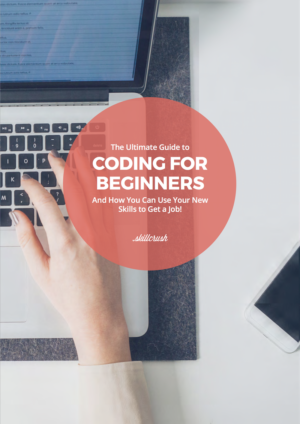
Get Our Free Ultimate Guide to Coding for Beginners
Make a plan for learning the tech skills you need to land a new job with this 60+ page FREE ebook!
Discussions about learning to code and working as a programmer often focus on the perks and benefits associated with the field—things like flexible job schedules, high pay (even for entry-level positions), and opportunities to work remotely. But what about the job itself? From the outside looking in, coding can seem like endless hours of typing gibberish onto a computer screen—a task that, quite frankly, sounds pretty boring. Do coders put up with fundamentally boring work just to get those perks and benefits? Or is the work of coding significantly different than what a newcomer might think? To get a solid answer, I spoke with two coders. Read on to hear what they had to say.
Coding is Not Boring.
The short answer to the question “is coding boring?” is—quite simply—”no.” Of course personal preferences can vary, but coding is so not boring for so many people that you’ll even find coders jumping to the profession from much flashier sounding backgrounds. Emily Kager, Mobile Developer at open source software company Mozilla, graduated from college with a degree in neuroscience—something that can hardly be considered boring, but she never felt strongly drawn to any career paths involving biological sciences.
“About a year after graduating, I decided to try a free ‘learn to code’ course online to see if I might like coding,” Kager says. She had so much fun with the class that she continued her coding studies and has now been doing professional developer work for about a year. Kager says in college she felt intimidated by the male-dominated engineering department and never even tried a computer science class, but is glad she finally made the leap. “I love that with programming you have the skills to make anything you want,” Kager says, “and I also love getting to solve puzzles with code, think creatively, and use problem-solving skills every day at my job.”
For Stephanie Melnyk, Developer at digital marketing solutions platform Vendasta, coding is also a huge part of her daily routine. Melnyk works with around five different programming languages every day, which—if coding were boring—would be a big job dissatisfier. However, for Melnyk this couldn’t be further from the truth. Not only is she happy with her job, she’s been a lifelong fan of code and it has yet to lose her interest. “Growing up, my brother used to spend of a lot time making his own computer games,” Melnyk says. “I would essentially be his guinea pig by testing out his games and game maps and trying to find bugs in them. I loved it! To me, it was exciting.” This excitement eventually led to Melnyk’s professional coding career, which she’s been doing actively for the last three years.
Coding Isn’t Just Not Boring—It’s Fun, Rewarding, and an Engaging Challenge
Kager says that working with code has direct, tangible rewards you can’t find in every field—namely the fact that coders are responding with product features and fixes based on the needs and wants of real people using their websites or software. In particular for Kager, working with open source software brings a special kind of pride. “Since our code is open source,” Kager says, “anyone can go look at how I solved a problem they might be having in their own app. It makes me feel like I’m contributing to universal knowledge, which is an amazing feeling.”
Melnyk shares the sentiment that coding offers gratifying rewards unique to the profession. “I love the instant satisfaction of seeing what you’ve built show up on a webpage and being able to know immediately whether it’s working or not.” Melnyk says. Additionally, Melnyk cites the challenges that come up during coding as big part of what makes it not only not boring, but actively engaging—things will go wrong with code, that’s a given, but learning from those challenges is what elevates code from any surface perceptions of being dull.
Melnyk says she realized how much she loved coding while she was learning to code in a Computer Systems Technology class. She and other students were building websites with HTML, CSS, Javascript, and PHP and Melnyk wasn’t working on her usual computer. After finishing about 70 percent of her work, she finished for the day, but when she came back and returned to the computer she normally used she couldn’t find any of the work she’d completed. “I figured none of it saved and I started over—this time until I was done building the site,” Melnyk says. “After I finished, though, I realized I hadn’t actually lost any of my prior work—I’d just saved it to the other computer’s hard drive instead of my roaming profile.” But, Melnyk says, she was surprised to find that she didn’t even care about having to do so much extra work. “I got so much hands-on knowledge through redoing the project and I loved every minute of it,” Melnyk says. “Getting to do it twice really helped me understand what I was doing and made me push myself that much harder.”
As Amazing as Coding is, There Will Always be Ups and Downs
While it’s clear that coding is definitely not boring, it’s still a job, and like all jobs there will be ups and downs. For Kager, one of her least favorite parts of coding has nothing to do with code and everything to do with outdated mindsets in the industry. “There’s a lot of gatekeeping in the field,” Kager says. “People who try to tell you, ‘if you aren’t an expert in X, then you don’t deserve to call yourself a programmer.’ It’s all BS, and a way to try to keep people intimidated from entering the field.” For Kager, the best way to combat this negative aspect of coding is to “ignore the haters” as much as possible, and to exert your own positive influence in the field as someone who helps make coding supportive and inclusive.
Meanwhile, some of the less fun parts of coding actually lead right back to what makes coding special in the first place. “The technologies are always changing and going in and out of style,” Kager says, “so you have to be really adaptable and willing to keep learning both in and out of work.” While Kager says that this can sometimes be tiring, but at the end of the day the process of constant learning is exactly what makes coding so engaging.
Melnyk echoes this, saying that the the dips in her own relationship with code come at times when she’s finally gotten into the groove of working with a particular programming language and suddenly there’s a workplace or industry shift to a new language. Melnyk says that these switches sometimes necessitate a bit of a learning curve (which can be stressful), but it’s also a time to come together with colleagues and team members and face the new challenges head on—something that sounds decidedly not boring.

Get Our Free Ultimate Guide to Coding for Beginners
Make a plan for learning the tech skills you need to land a new job with this 60+ page FREE ebook!

